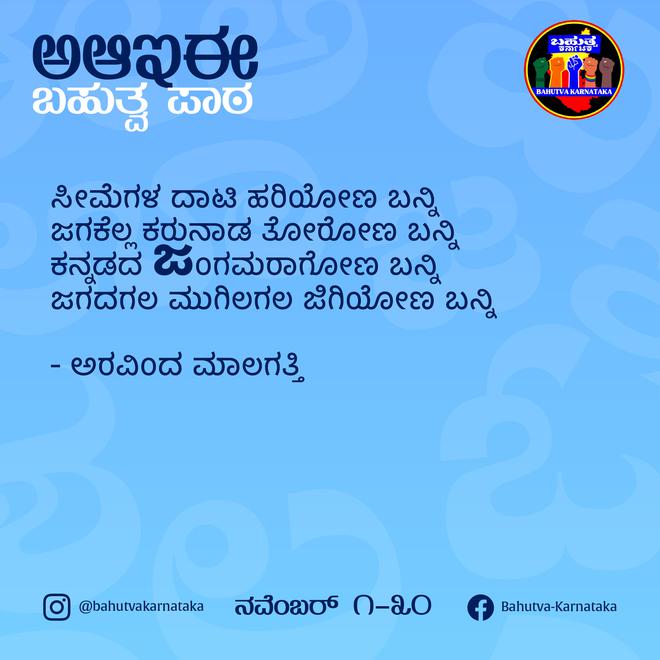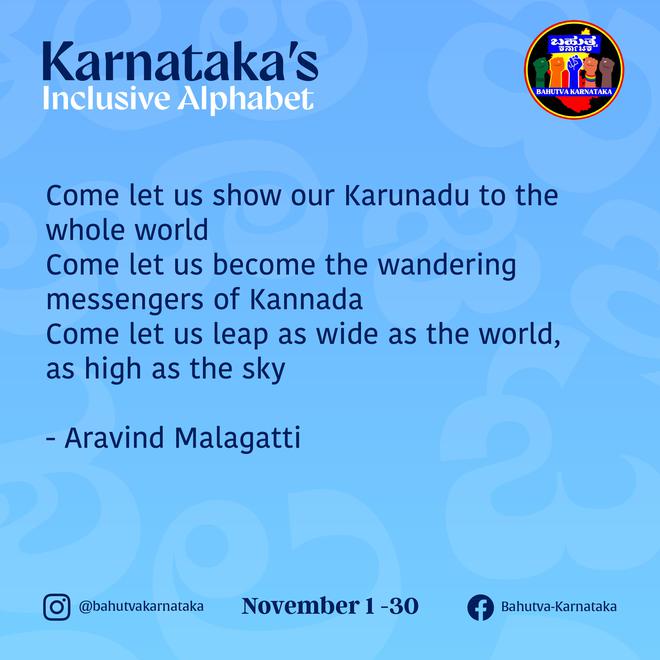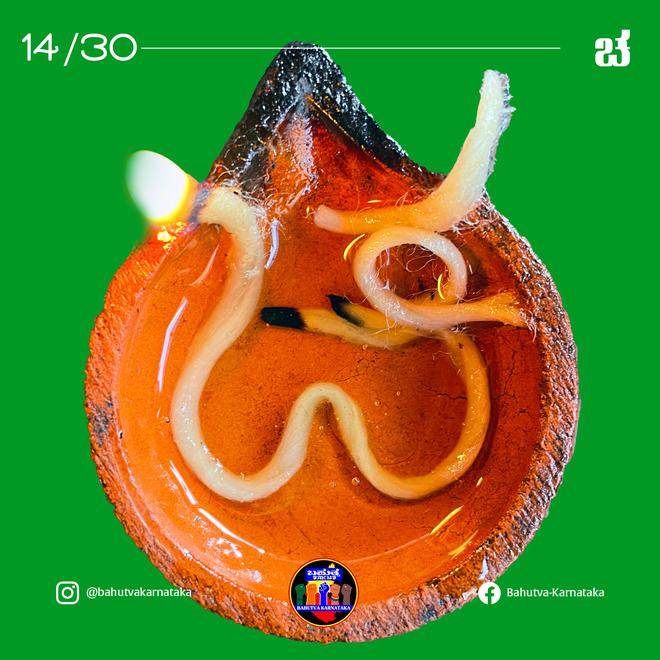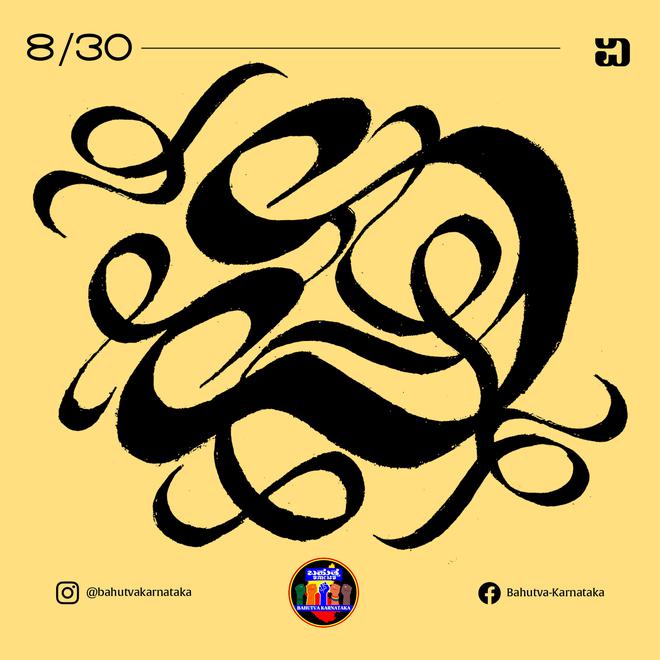“Every child is born a universal human being. We make him or her a mean human being as he or she grows up. The task of education is to make him or her a universal human being again,” reads the English translation of Kuvempu’s idea of ‘Vishwamanava’ or ‘universal human being.’
The concept of Vishwamanava has been one of the most significant contributions of the revered poet and philosopher from Karnataka to the idea of modern India.
On the 50th anniversary of the renaming of Mysore State as Karnataka, civic rights group Bahutva Karnataka has come out with an ‘Alphabet series’ which aims to give people an insight into the state’s rich legacy of literature, diversity, and plurality, and how they contribute to the modern ideas of democracy.
A letter from the Kannada alphabet has been chosen for each day of the month of November, and a quote which either begins with or features the letter is presented every day through the organisation’s social media channels.


Small sample of a rich legacy
“It’s a very small sample of the very rich literary culture of Karnataka,” says Prof. Janaki Nair who is a former professor of history at JNU and a member of Bahutva Karnataka.
“The campaign starts with the fairly older kinds of texts. The Vachnakaras feature quite prominently because they have contributed and continue to be one of the most significant contributions to the Kannada language in terms of the kind of society that is possible. We have some figures from the 19th century talking about the syncretic traditions as well as quite a large number of contemporary figures who are writers, poets, literary critics and so on,” she adds.
Bahutva Karnataka being an organization trying to promote the plurality of the state, most of the works chosen for the campaign talk about the roots of this plurality, notes the team.
“The plurality and the specificity of Karnataka is the way that Karnataka has become Indian. It has not dissolved its identity in order to be Indian. That’s the overall message,” Prof. Nair explains.

An entry point
The campaign was inspired by a similar artists-driven initiative in Sri Lanka which used Sinhala and Tamil alphabets to talk about shared histories.
Anupama Hegde, an IT professional and member of Bahutva Karnataka, notes that many people are deeply proud of the heritage and the culture of the state.
“The team felt that the Kannada alphabet could be a beautiful entry point to Karnataka’s rich literary and philosophical world,” she says.
The campaign was designed broadly in the order of the Kannada alphabet. But there was a constraint. While there are 49 used letters in Kannada language, the month of November has only 30 days.
So, the team had to pick and choose the letters. Prof. Nair worked on choosing the quotes with the help of C.G. Manjul, N. Gayatri and Nataraj Vishwanath, all well versed in Kannada literature.
The quotes were translated by G Ramakrishna and Madhava Prasad, while the illustrated versions of the letters were designed by artist and professional designer Rohan Parameswara. . Rohini Rajashekhar managed the social media.
“We tried our best to cover all the letters, but there were some letters which immediately did not link to a quotable quote. Since it’s a very short campaign, we tried to work more with poetry and the vachanas, and not so much prose,” says Prof Nair.
“Unfortunately, we had limited time and limited number of days. So, we tried to include as many different types of voices as possible.”

In sync with Constitution
The campaign also coincides with Constitution Day which is celebrated on November 26.
“The values of the Constitution, such as fraternity, dignity and equality, which are thought of as Western values, can be seen in our literature,” says Vinay K. Sreenivasa, activist and member of Bahutva Karnataka.
He points out that the vachanas or quotes by prominent literary figures highlighted in the campaign reflect these values.
“Bahutva or pluralism is something which is inherent to this land; Which is why, the kind of poetry we’ve shared also speaks about that. The aim of this campaign is to show that our Constitution values are actually in sync with what people have been hearing from Basavanna or Kanaka Dasa or others like them,” Mr. Sreenivasa says.
Prof. Nair adds to this and explains how the campaign is relevant to the current times where the ‘one nation one language’ calls are getting louder.
“We are at a stage where the federal principle of India as a union of states is being questioned. Our entire national movement was built on linguistic regions. The mobilization was happening in the respective regional languages in different parts of the country. That respect for the linguistic region was not just built into the Constitution, but was also respected by the political parties of that time.”
“One would like to remind people of this and also of the importance of preserving linguistic specificity. There is some concern about the fact that we are now being asked to subscribe to ‘one nation one language’ and so on and so forth. The crux of this campaign is that oneness need not be denying the specificity of languages in different regions,” she says.

Caste as a recurring theme
The campaign also throws light on the syncretic culture of the state by showcasing the writings of Siddalingaih, M. Govinda Pai and women Vachanakaras like Akka Mahadevi.
“We’ve drawn on the works of 12th century to contemporary writers. They talk about empathy, equality, fraternity, tolerance, compassion, dispelling ignorance, shunning rituals, shunning caste and so many things that are so very relevant even today,” Ms. Hegde says.
She notes that the idea was to draw people to such ideas and make them engage with and reflect on them.
The campaign has also tried to represent the major transformation that Kannada literature underwent as it became more inclusive of writers from different backgrounds. A very important turning point, Prof. Nair points out, was the emergence of Dalit Sahitya from the 1970s onwards.
Interestingly, in the Alphabet series, caste is a recurring theme. Represented in different ways in writings by different people, it essentially reflects the multiple streams of thought that have emerged from the state exhorting to think beyond caste.
Prof. Nair notes, “Quite a large number of the people whose thoughts are expressed in this campaign are essentially talking about caste. It came up quite naturally while we were working on selecting the quotes. There are several such interesting themes related to an imagined Karnataka as a place that can be plural and harmonious.”
Contribution to Rajyotsava
The team behind the campaign hopes that the series would serve people, who may or may not know Kannada, to get an insight into the long historical past of the language, the breadth and depth of its literature, and the deep philosophical roots of the state.
“We hope that this will lead to a larger exploration of Kannada literature,” Mr. Sreenivasa says.
Prof Nair adds to it.
“It’s not intended as literary history. The campaign just gives you a sampling of the kinds of thoughts that have been here. It’s our contribution to the idea of Rajyotsava and to an understanding of plurality as the only way of being Indian by taking Karnataka as the example.”







